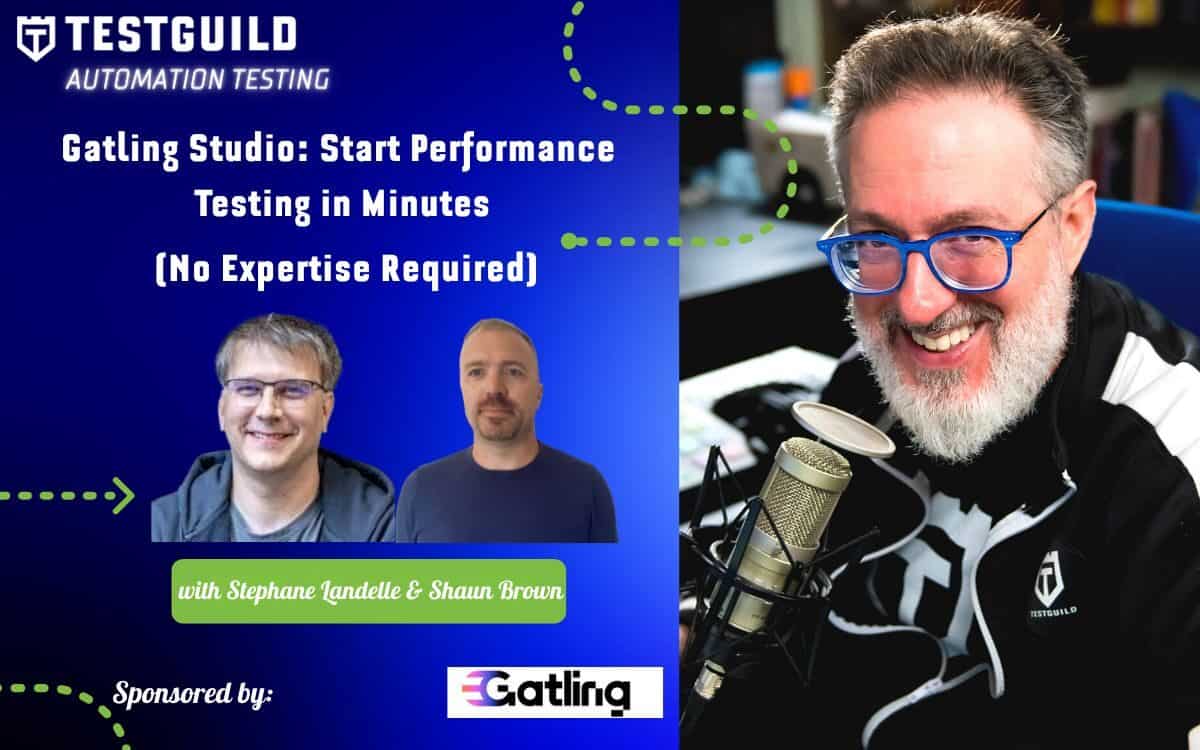About This Episode:
What are some of the top Automation Trends for 2024
How do you do Contract Testing using Playwright
Have you seen the video on how you can easily learn to Build, train, Test and deploy machine learning models?
Find out in this episode of the Test Guild New Shows for the week of Jan 7th. So, grab your favorite cup of coffee or tea, and let's do this.
Exclusive Sponsor
This episode of the TestGuild News Show is sponsored by the folks at Applitools. Applitools is a next-generation test automation platform powered by Visual AI. Increase quality, accelerate delivery and reduce cost with the world’s most intelligent test automation platform. Seeing is believing, so create your free account now!
Applitools Free Account https://rcl.ink/xroZw
Links to News Mentioned in this Episode
| Time | News Title | Link |
| 0:22 | Subsribe to Newsletter | https://testguild.com/newssub |
| 0:30 | WebDriver BiDi with Puppeteer | https://testguild.me/x355g9 |
| 1:41 | 4 difficulty levels of creating test data | https://testguild.me/gmvxa4 |
| 3:03 | API Contract Testing on Frontend with Playwright | https://testguild.me/so7lio |
| 4:20 | Automation 2024 Trends | https://testguild.com/automation-testing-trends/ |
| 5:12 | Build, Test machine learning models | https://testguild.me/l9d3b3 |
| 5:58 | appium-interceptor-plugin | https://testguild.me/da67uf |
| 7:18 | PayPal Billion Transactions per Day | https://testguild.me/78ncs1 |
| 8:30 | OpenTelemetry and Observability | https://testguild.me/ba0h63 |
News
[00:00:00] Joe Colantonio What are some of the top Test Automation trends in 2024? How do you do contract testing using Playwright? And have you seen the video on how you can easily learn to build, train, test, and deploy machine learning models? Find out in this episode of The Test Guild News Show for the week of January 7th. So grab your favorite cup of coffee or tea and let's do this.
[00:00:21] Joe Colantonio Before we get into it. If you haven't already, please make sure to subscribe to The Test Guild LinkedIn newsletter that I'll have a link for down below to never miss another episode.
[00:00:30] Joe Colantonio First up, we have Puppeteer who's announced a new capability, and this announcement is how they've extended its capabilities to Firefox utilizing the new WebDriver BiDi protocol. WebDriver BiDi is a fusion of the best features from WebDriver Classic and Chrome Dev Tools Protocol, allowing bidirectional communication for more efficient and capable browser automation, and this development promises a granular control and efficient automation experience. And progress has been made in Puppeteer's implementation, which enables a bunch of features like logging network events and form submissions through WebDriver BiDi. And they also say that Puppeteer's integration with WebDriver BiDi is still in progress, and while features like Cookie Access and Network Request Interception are still under standardization, the current state demonstrates the protocol's growing functionality and reliability. So if you haven't checked out Playwright yet, if you haven't checked out WebDriver BiDi, it's a great way to learn both of them together. It's really up your automation game in 2024, and you can find the links for this in the comment down below.
[00:01:35] Joe Colantonio Want to know the 4 difficulty levels of creating test data? Well, I found a link to an article that's going to help you with this.
[00:01:41] Joe Colantonio So this link to an article by Ivan goes over or likens data generation for testing to difficulties setting in a video game. And it's a fun way to learn more about different test data approaches you could be using. So one level is the Hell level, and that equates to manual data entry. It's deemed the most challenging and also the least recommended. Suitable only for really quick one-off situations with restricted access. Also nightmare level involves automating data entry through UI, which well better than manual input, is slow, and often unreliable. And I really like number three, which I think should be the normal mode, and he calls it the normal level. And that's seen as a more balanced approach, which advocates for using APIs for data generation. And this method is significantly faster and more effective than the UI approach, for sure, bypassing the need of a heavy UI framework. And for those unfamiliar with coding tools like Postman can also facilitate this process. And lastly, he goes over the easy level, suggesting direct database inserts. But data generation. However, this approach comes with caveats like potential complexities in the database structure and access restrictions. But he advises using the API method if these issues arise when you try to do the easy level. Thank you, Ivan, for this fun, readable article that gets us to think more about how we can approach test data in 2024.
[00:03:04] Joe Colantonio This next resource is all about how to do API contract testing using Playwright. This approach by Andrey goes over a novel way to really ensure that front-end applications interact correctly with third-party APIs, so contract testing continually use for verifying interactions between microservices is now being applied to client-server architectures. But the front end acting as either a consumer or provider of various APIs. And this method is really useful with third-party APIs that cannot be directly accessed during tests. Playwright comes into play by allowing the simulation of API interactions at the network level. And I really liked how this article highlights a practical example of using a cryptocurrency app that demonstrates how Playwright can interact and intercept the test API requests made by the front end. And this process involves checking the request contract against predefined schemas ensuring the front end makes specific requests in the correct format, and this approach to contract testing on the front end not only streamlines the testing process, but it also ensures a high degree of accuracy and reliability in your software development of your application. So another cool feature of how you can leverage Playwright for other types of testing. And you can find that link in that comment down below.
[00:04:20] Joe Colantonio Also, as it is the first News Show of the new year, I want to share with you my annual top Automation Trends for 2024. I just released this. It goes over the top 12 automation testing trends that you need to know in the new year. This year, one of the key takeaways is the increased integration of AI machine learning, its automation testing promising more effective, efficient, and accurate results. Also, a significant shift as seen in testing practices, the focus on catching bugs earlier in the development cycle, and the rise of testing directly in production environments, and how to handle real-world user at scale. And this article goes over how to do that and what my top trends are that I definitely think you need to know, and I'm curious to know if you're seeing the same thing. I'd love to know your thoughts after you read this article. What you think, what I missed, what I may have been spot on? Or if something I'm completely wrong. Let me know in the comments down below.
[00:05:12] Joe Colantonio So seeing how AI has only going to grow more in 2024, it's not a silver bullet. But I think as a tester you need to know more about it. You need to know how you can build it. Keep your hands dirty a little bit on a simple example and how you can test it. So I found a great resource that teaches you how to do this. And this is by Geosley, who just dropped a new video that goes over how to build, train, and deploy a machine-learning model using an Azure free account. So the video goes over creating a workspace in Azure Machine Learning Studio, how to uploaded and validate the data set for training. I think he goes over setting up a compute cluster for machine learning. There's an example on automating the machine learning algorithm using Azure. And as I mentioned really critical. It goes over how to test and deploy the machine-learning model as a real-time endpoint.
[00:05:58] Joe Colantonio I also just learned of a new Appium plugin that you should know about as well. And this is by Sai and it's called the Appium interceptor plugin. And Sai has just released this in its first beta version. And this is a real cool tool because it's designed to make mobile automation easier by introducing the ability to intercept and mock API responses. So utilizing the mit and proxy a well-known two in the field of network monitoring, the plugin operates by starting a proxy server for each Appium session, and this server then redirects all network traffic from the device through the proxy, allowing for detailed monitoring and manipulation of API responses. Really cool technique, and the plugin, while powerful, is also user-friendly with mocking capabilities that are disabled by default to ensure ease of use. You can also enable this feature by setting the Appium intercept capability to true when interacting with a new Appium session. And this flexibility makes the tool adaptable to a wide range of testing scenarios. So all your developers and testers in the mobile app space really are encouraged to try this out. And also, Sai is looking for feedback from you in the community to further redefine and enhance this capability. Definitely give it a try and let's Sai know what your thoughts are. And you can find the link to this in the comment down below.
[00:07:18] Joe Colantonio So I love looking for real-world stories on how people succeed with making their applications not only functional, correct, but also perform it. So here's an article that goes over how PayPal actually did this. And so this is a story of PayPal's system design evolution. And this article goes into detail on how PayPal started, how the system started, and how it faced explosive growth, and how it quickly reached a million transactions per day, but soon encountered the limitations of Moore's Law as single-thread performance gains slowed down. And it also goes over how the traditional approach of scaling up with newer hardware became inadequate, leading into PayPal to adopt horizontal scaling over 1000 virtual machines. And how this solution, though, introduced new challenges such as increased latency, costly network maintenance, complex infrastructure, and insufficient CPU usage. And it goes over how it solved all these issues using an actor model, and this model enabled PayPal to handle a billion daily transactions in just eight virtual machines, which is mind-blowing. So if you haven't checked out the actor model, this article goes over into detail what it is.
[00:08:24] Joe Colantonio So one of the trends on my top 12 trends for 2024 was on observability. This next article goes over a little more in detail open telemetry and observability. So last year I talked to a lot of people, and many people talked about open telemetry, how it made a lot of different achievements and stable releases of three-course signals tracing metrics, and logging. And this development represents a big step in realizing Open telemetry's vision as a standard framework for collecting observability data. This article highlights some key highlights from the year, including the widespread adoption of open telemetry specifications and metrics and integration of distributed tracing, and leading load testing tools like Grafana, K6, and Artilleryio. And these achievements have enabled more detailed analysis and performance optimizations during load testing, which is critical and also highlights the growing trend towards expanding the use of observability tools into development and testing phases, which is critical if you haven't checked out observability as a tester, 2024 is a year that you definitely need to learn more for sure.
[00:09:30] Joe Colantonio All right, for links of everything value we covered in this news episode, head on over to the links in that comment down below, and if you haven't already, I highly recommend you subscribe to the Test Guild LinkedIn News Show Newsletter, which we'll have a link for down below as well. And once again, I'm Joe, my mission to help you succeed in creating end-to-end full-stack pipeline automation awesomeness. As always, test everything and keep the good. Cheers!
Sign up to receive email updates
Enter your name and email address below and I'll send you periodic updates about the podcast.




